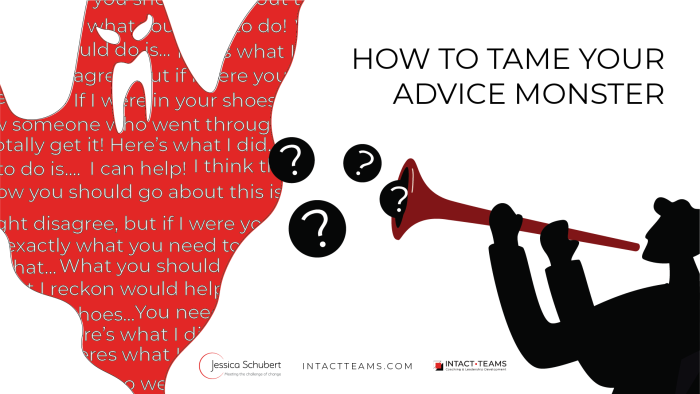If you like it or not, we all have an advice monster. And it probably pokes its ugly head up more often than you think. What is an advice monster, and how can I tame it, you ask? Here are some of my advice monster experiences, plus insights from one of my favourite authors.
“My advice monster had sabotaged the conversation. Again.”
Michael Bungay Stanier (MBS)
I was catching up with an old friend of mine, let’s call her Jane, the other day. She was talking about how she struggled at work and is considering looking for a new job. That topic is right up my alley, and I had lots to say and plenty of advice for Jane, so in I went with advice on how to go about her career change.
Her reaction: ‘Uh yeah, ok. Mmhh’. Which means:
‘Yeah, nuh!’
My advice, of course, was less than helpful. In fact, it sabotaged my conversation with Jane.
Michael Stanier Bungay (MBS) describes what I did as our advice monster being in control. Check out his TedTalk ‘Taming your Advice Monster’.
How do we give our advice monster control? As humans, we have developed a habit of listening to reply rather than listening to understand.
We usually start by listening to the other person with curiosity and openness. But very quickly, our brain switches to ‘I recognise this (pattern), and I have something to say here’. The way we change from curiosity to making assumptions and telling others what to do stops us from listening.
We are no longer open to understanding what is really going on with the other person; we have made up our mind about what the problem is and how to solve it.
We have turned into advice-giving maniacs.
I published a blog about this topic a while ago where I give some insights on what the challenges are with giving unhelpful advice:
1. Overstepping boundaries
People give unsolicited advice meaning they are not being asked to or they give bad advice, e.g. they are not qualified or experienced to give advice. This reminds me of the many ‘armchair experts’.
2. Not understanding the problem fully
Giving advice when people don’t fully understand is what I see the most in workplaces. Leaders don’t ask questions for fear of looking incompetent or ‘thinking’ they completely understand the situation.
3. ‘If I was in your shoes’
This is when people give ‘pseudo empathetic’ advice. They think they understand the situation the other person is in but without having a coaching conversation, this approach is often self-centred.
4. Unhelpful advice:
Advice giving can often result in vague recommendations without guidance or specific advice on how to solve the problem. That often leaves the other person confused with more questions than before or leads to procrastination.
‘I know, and you don’t!’
When we give advice, what we are really saying is: ‘I know, and you don’t!’ Of course, there is a time and place for giving advice, but we have to be careful not to let advice-giving be our default response. MBS explains in his talk that when your advice monster is in control, you are telling the other person that you are better than them. Nothing is more disempowering.
How can I tame my advice monster?
Recognise first what persona your advice has. MBS talks about three personas:
1. Tell it.
The only way to you add value is to have all the answers all the time. And if you don’t, you fail
2. Save it.
Your job is to rescue everybody. If anyone struggles, you fail.
3. Control it.
Your monster convinced you that the only way to win is to maintain control at all times.
What persona does your advice monster have? Mine is definitely ‘Save it’. I wanted to save Jane, help her be happy and successful and find a new job. But her problem was actually quite different from what it originally sounded. And that’s often the case. The first challenge is often not the real challenge.
I wish I had tamed my advice monster and done this instead.

Tame your advice monster by staying curious a little longer and ask questions.
I learned to adopt the skill and create the habit of presence, curiosity and asking questions through my coaching education and practice.
A lot of my work with leaders is to help them home in on their leader-as-coach approach. Stay curious (or go back from solution-thinking to being open when you find your mind wandering) and ask questions that help the other person make sense of their situation and explore the real challenge and what else matters. In a coaching approach we want the other person to expand their thinking and look at challenges from different perspectives.
Some examples of open questions:
- What do you mean by…?’
- ‘What information do you have right now?’
- ‘What else?’
- ‘What does it look like….?’
- ‘What are other challenges?’
- ‘What is most important?’
- ‘Who is important?’
- ‘If…then…’
Next time you are in a conversation, be aware of your advice monster and tame it by staying curious and ask at least one more question.
Get in touch if want to know more about leader as coach workshops: jessica@intactteams.com







